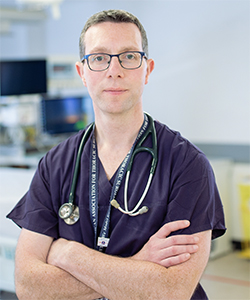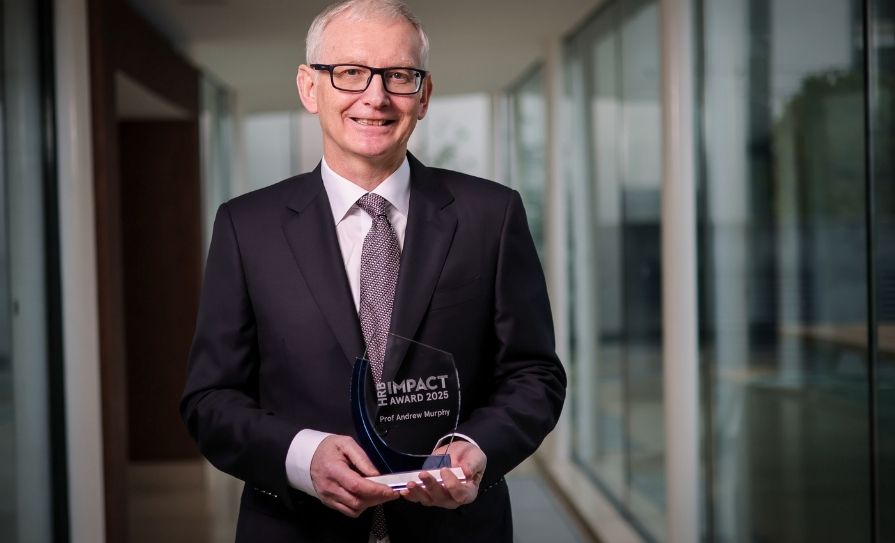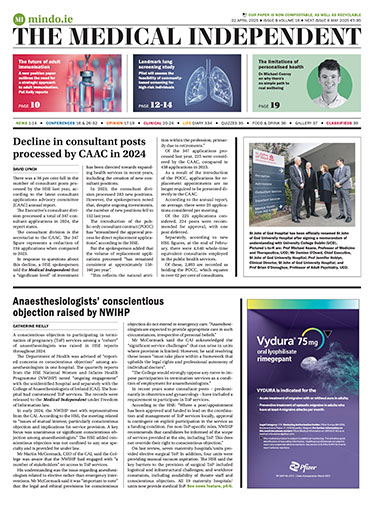Mr Gerard Fitzmaurice, Consultant Cardiothoracic Surgeon, speaks to David Lynch about developments in lung cancer care at St James’s Hospital, Dublin, and nationally

Lung cancer is the fifth most common cancer in Ireland with almost 2,600 people diagnosed each year, according to the Irish Cancer Society (ICS).
Based on recent data published by the National Cancer Registry Ireland (NCRI), it was the leading cause of cancer death between 1994 and 2020. The survival rate of patients with lung cancer has more than doubled since the 1990s. While this trend is welcome, the disease is often caught too late to allow for surgical intervention.
As the surgical referral unit for four of the eight rapid access lung cancer clinics in Ireland, St James’s Hospital, Dublin, plays a pivotal role in the provision of this care. In March, this service was internationally recognised when the hospital’s department of cardiothoracic surgery was awarded institutional accreditation by the European Society of Thoracic Surgeons (ESTS) (See panel).
Quality
“I think the single biggest thing about the accreditation is that it is a quality marker,” Mr Gerard Fitzmaurice, Consultant Cardiothoracic Surgeon, Trinity St James’s Cancer Institute, told the Medical Independent (MI). Mr Fitzmaurice, who was also the hospital’s accreditation team lead, said that it “reassures” surgical patients who attend St James’s that they receive care that “is equivalent” to major cancer centres across Europe.
“For clinicians it is a similar quality marker,” he said, “so clinicians [across Ireland] who are referring patients to St James’s can be reassured that they are sending patients to the best hospital in Ireland for the treatment of lung cancer from a surgical point of view.”
Centralisation of cancer services, including surgical care, has been a priority within all the national cancer strategies over recent decades. The process has led to significant advances in specialised lung care in St James’s, according to
Mr Fitzmaurice.
“Because we do such a significant volume of surgery for lung cancer we have developed a special expertise in the…perioperative [management] of complex lung cancer care,” he told MI.
Specialism
Lung cancer, like many types of cancer, benefits from being managed in centres that provide care to a high number of patients, according to Mr Fitzmaurice.
“In St James’s we look after more than half of the patients in Ireland who have surgery for lung cancer, so we have developed a unique specialism within complex lung cancer care.” This includes services for patients who have advanced disease – for example, cancer which has spread “into the major blood vessels around their heart and into their chest wall”. Another area of specialism is perioperative management of patients who may be receiving newer treatments, or on clinical trials.
Mr Fitzmaurice said that in a reasonably small country, it is preferable to centralise the management of more complex treatments in a main centre, or hub, which would provide support to other units. This approach facilitates the streamlined transfer of patients along a dedicated pathway, offering those with more complex lung cancer the chance to undergo surgical management in a specialised centre.
Comparing Ireland’s lung cancer care to that of the UK, Mr Fitzmaurice said patient outcomes in this country are “much better”. He attributed this, in part, to the centralisation of cancer care which commenced in 2007.
“One of the big things in Ireland from the cancer strategies… was the establishment of these eight rapid access lung cancer centres and four surgical centres.”
Mr Fitzmaurice said that “ideally” all lung cancer cases would be “centralised within that pathway”; however, he added there are still patients who are managed outside this process.
The important role of St James’s within this system has meant “from a surgical point of view, over the years, we have built up a wealth of experience of managing more complex lung cancer patients… and also in undertaking surgery and looking after them in their post-operative recovery”. He said there “is a fantastic team and a wealth of experience” at the hospital.
“I suppose the whole overarching aim is to see can we continue to improve how we look after Irish people who have lung cancer.”
In St James’s we look after more than half of the patients in Ireland who have surgery for lung cancer, so we have developed a unique specialism within complex lung cancer care
Screening
But significant challenges remain. Mr Fitzmaurice noted that “unfortunately” lung cancer is the number one cause of cancer mortality in the country and “it is only going to get more common”.
Highlighting predictions from the NCRI that there will be a “significant increase” in lung cancer in the coming two decades, Mr Fitzmaurice said Ireland “has to have some kind of plan or strategy to manage that”.
He also noted that, as with all cancer treatments, “the options and pathways for care are constantly evolving and getting more complicated.” This makes specialised centres of excellence essential.
“So if you try, particularly for the more complicated cases, to give people the opportunity to begin with the unit that has the most experience of managing those patients, it just kind of makes sense – that you would hopefully improve the opportunity for those patients to have surgery and also improve outcomes.”
Asked what the single biggest difficulty in lung cancer is from a clinician point of view, Mr Fitzmaurice replied: “Early diagnosis, without doubt.”
“The vast majority who have lung cancer, by the time they present, and have symptoms, it has already spread or metastasised or become too advanced to have an opportunity to have a treatment with a means of curing them. One of the biggest focuses for everyone who is looking after lung cancer patients is how we can try and find the patients who have lung cancer earlier.”
Mr Fitzmaurice cited cases where a patient might be scheduled for an unrelated operation and “for some reason, they have a chest x-ray and they are picked up [with lung cancer]”. However, he noted such instances are “pure luck”.
“We need to have some kind of mechanism where we [target] patients who are in a high-risk group and see if we can offer them a mechanism to identify lung cancer earlier.
“So, I suppose I’m talking about lung cancer screening, which is the ultimate aim, so that patients are detected earlier. The best way to do that is with screening.”
Currently, there is no national screening programme for lung cancer in Ireland, but work is underway in the area. Mr Fitzmaurice is currently one of the people involved in a screening pilot project that involves the RCSI and the ICS.
“There is a lot of work going on,” he said. He hopes that the pilot “can demonstrate in the Irish population that lung cancer screening would be beneficial”. And that this would mean the case “for more widespread use of lung cancer screening” in Ireland would be made stronger.
One of the biggest focuses for everyone who is looking after lung cancer patients is how we can try
and find the patients who have lung cancer earlier
International recognition for St James’s
The department of cardiothoracic surgery at St James’s Hospital, Dublin, was recently awarded European Society of Thoracic Surgeons (ESTS) accreditation
in thoracic surgery. St James’s is the first Irish hospital to receive this award.
It is home to the largest thoracic surgical oncology programme in Ireland. According to the hospital, “the accreditation recognises the high-quality
care provided by St James’s Hospital to lung cancer patients, in particular.”
The hospital provides surgical care to approximately 55 per cent of the Irish population with lung cancer and the “accreditation acknowledges the role that St James’s Hospital plays in improving national survival rates from the disease”.
The ESTS institutional accreditation aims to standardise general thoracic surgery practice across Europe. St James’s Hospital supplied data on surgeries performed to treat cancers in the chest since 2019. This data, as well as many years of multidisciplinary work at the hospital to enhance surgical programmes, led to the ESTS inviting the hospital to undertake accreditation and the ESTS selecting St James’s as its latest accredited centre in Europe.
Prof John Kennedy, Clinical Professor of Oncology at Trinity College Dublin and Co-Director of the Trinity St James’s Cancer Institute (TSJCI), said: “Lung cancer is the leading cause of cancer mortality in Ireland and diagnoses of lung cancer are increasing. Here at St James’s Hospital we offer surgical intervention to patients from all over Ireland.”
“This accreditation is testament to the dedication of the multidisciplinary team and the vast array of clinical support specialities that combine to facilitate delivery of exceptional care to a complex patient cohort.”
When assessing the criteria for accreditation, the ESTS examined the infrastructure of the department of cardiothoracic surgery, the training available for staff, and the clinical facilities and breadth of specialties offered at the hospital.
St James’s Hospital CEO, Prof Mary Day, said: “St James’s has a long history in the treatment of lung cancer in Ireland and this accreditation would not have been possible without the clinical expertise that we have developed.”
She added that the “ESTS accreditation firmly cements St James’s position as a leader in lung cancer care in Ireland”.
The ESTS is the largest international general thoracic surgery organisation with over 1,600 members from over 91 countries. Its mission is to improve quality in all aspects of the specialty from clinical and surgical management of patients to education, training and credentialing of thoracic surgeons worldwide. Institutional accreditation awarded by the ESTS is valid for a period of 36 months.
“This accreditation is a significant achievement,” said
Mr Gerard Fitzmaurice, Consultant Cardiothoracic Surgeon, TSJCI.
He added that it was a “marker of excellence for the hospital. St James’s Hospital has the most up-to-date data on lung cancer in Ireland and we are the only Irish centre which submits data to the ESTS; therefore, we have been able to benchmark our service against comparable, high-volume European centres which are managing the equivalent complexity of lung cancer care.”
“We know that centralisation of surgical management in complex cancer care improves patient outcomes. This accreditation process underlines St James’s vision to be a national hub for excellence in complex lung cancer surgical care helping to support the other centres in Ireland.”
The TSJCI is operated jointly by Trinity College Dublin and St James’s Hospital and was the “first cancer centre in Ireland to receive international recognition from Europe’s leading cancer accreditation agency, the Organisation of European
Cancer Institutes (OECI)”.
The TSJCI “aspires to become an OECI-accredited comprehensive cancer centre with national services in areas such as genomics and immunology, a leading international institution for translational cancer research with an extensive international network”.
The TSJCI “is currently working towards this goal which should directly improve the experiences and outcomes for cancer patients in Ireland”.













Leave a Reply
You must be logged in to post a comment.